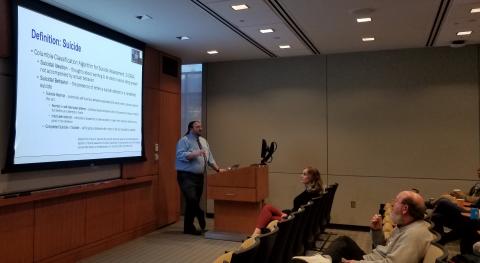Bench to Bedside: Suicide Risk and Prevention

Current suicide predictors are not powerful, but neuroscience graduate students at Brown University got an exclusive look at novel approaches to suicide prevention.
Michael Armey, associate professor of psychiatry and human behavior, and Leslie Brick, assistant professor of psychiatry and human behavior, presented their research on Thursday, Oct. 25, at Bench to Bedside, a seminar series organized by the Carney Institute for Brain Science that is presented as part of the Neuroscience Graduate Program Seminar Series at Brown University. The seminar series introduces students to diseases and disorders of the nervous system and highlights areas of research that could have impact on the diagnosis, treatment or other outcomes for patients and clinicians.
Armey’s research encompasses the use of novel measures and methods to assess suicidal and non-suicidal self-injury. The goal is to identify processes and mechanisms amenable to intervention. He uses novel multimethod approaches that show promise in the prediction and prevention of suicide, including ecological momentary assessment (EMA)—a mobile-based, repeated sampling of subjects' behaviors and experiences in real time, in subjects' natural environments—along with laboratory-based behavioral assessment paradigms such as behavioral tasks, psychophysiology, and eye-tracking.
Brick’s research, on the other hand, focuses on the intersection of biology and mental health to better understand risk for substance use behaviors and stress sensitive consequences such as PTSD, depression, or suicide. She shared the results of two newly completed research projects: a study examining the use of EMA in teens recently admitted to the hospital for suicidal behaviors, and another study of the genetic variability of suicide risk.
The next Bench to Bedside seminar will be held on Dec. 6 and it will focus on spinal cord repair.



